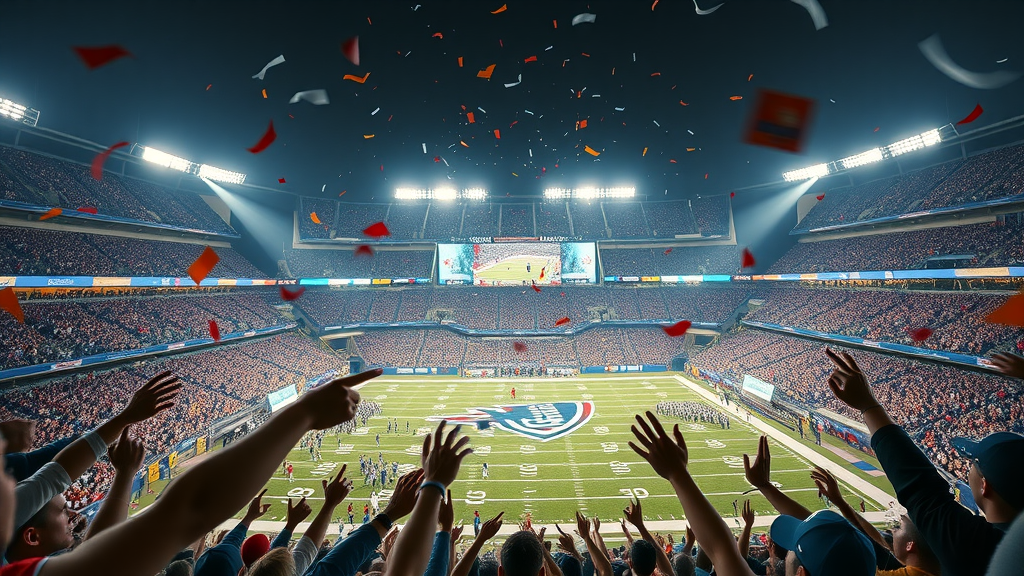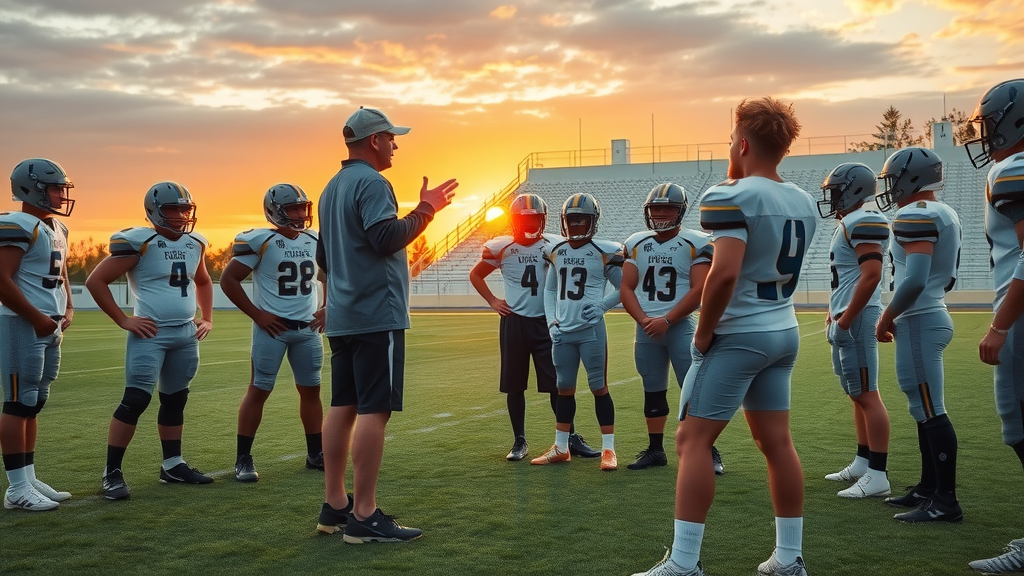Did you know that over 100 million Americans gather annually to witness the Super Bowl, making it one of the largest single-day sporting events in the world? This remarkable phenomenon reveals that the importance of American football reaches far beyond the playing field—it's stitched into the very soul of American culture. Whether it's the roar of the crowds at a college football game, the thrill of the end zone touchdown, or the spectacle of the halftime show, American football impacts nearly every aspect of society, from family rituals to community pride. In this article, you’ll discover exactly how football influences American culture , why it’s a rite of passage for many young athletes, and what this beloved sport teaches us about unity, identity, and the spirit of the United States.
Striking Facts: The Ubiquity and Cultural Weight of American Football
In the United States, the omnipresence of American football is undeniable. From NFL teams to high school football leagues, the sport dominates fall weekends, unites cities, and ignites friendly rivalries. American football isn’t just a popular sport—it shapes television schedules, advertising strategies, and even inspires community-centric non-profit events. According to recent studies, the Super Bowl ranks among the most-watched sporting events in the world, bringing together people of all backgrounds to celebrate an unofficial national holiday . Football leagues, collegiate championships, and even youth football competitions regularly fill stadiums and living rooms alike. This widespread enthusiasm demonstrates how deeply entwined the sport is with American values such as competition, achievement, camaraderie, and perseverance.
"An estimated 100 million Americans tune in to watch the Super Bowl each year, demonstrating just how deeply American football is woven into the national fabric."

How the Importance of American Football Drives American Culture
American Football and Its Profound Influence on United States Identity
The impact of American football goes far beyond athletic competition. It’s a living, breathing emblem of American culture and identity. Football’s traditions—such as tailgating before a football game, singing the national anthem on the field, and celebrating championship games—foster a sense of unity and pride. These moments become meaningful rituals that bond generations, from childhood introductions to football game Sundays to the anticipation of the first field goal in a new season. Moreover, American football reflects the spirit of the United States : a blend of teamwork, strategy, and relentless effort. Every snap at the line of scrimmage, every remarkable forward pass, mirrors the competitive nature and innovative thinking that characterizes both the game and the nation. Cities and towns rally around their teams, whether cheering on a local high school, a college football giant, or a storied NFL franchise, reinforcing shared identity and pride.
Why the Super Bowl Is a Cultural Phenomenon Beyond Sports
The Super Bowl is not just a championship game—it’s the culmination of football season and one of the greatest spectacles in global entertainment. What makes the Super Bowl such an unrivaled event in American culture is its ability to transcend sports. For many, the halftime show, the much-anticipated commercials, and watching with family and friends are as important as the action on the field. This annual event serves as a mirror for American popular culture. Traditions such as Super Bowl parties bring people together, regardless of who’s playing. Advertisers invest millions to capture the country’s attention, making Super Bowl ads a memorable part of the experience. Meanwhile, performers at halftime become part of pop culture history. This convergence of sports, media, and celebration cements the event’s central role in the United States' cultural calendar.

Tackle Football and Flag Football: Contrasts and Contributions to Youth Football
Tackle Football’s Impact on Youth Football and Character Development
At the heart of youth football is tackle football—a physically demanding, highly strategic version of the sport that many believe develops resilience and leadership. Young athletes learn far more than how to carry a ball or make a play; they develop the discipline, teamwork, and perseverance needed on and off the field. The competitive environment of tackle football can instill life lessons about handling adversity, respecting rules, and celebrating both victory and effort. Balancing the excitement of the end zone leap or the strategic call at the line of scrimmage, youth football challenges players to work collectively and feel accountable to their teammates. Coaches and leagues put a strong focus on safety and technique, ensuring that the values of respect and sportsmanship are just as emphasized as scoring touchdowns. These principles echo well into adulthood, shaping how young people interact in society and rise to the challenges of both sports and life.
The Rise of Flag Football and Inclusion in American Football
As the conversation around player safety intensifies, flag football has emerged as a popular and inclusive way to experience the thrill of American football. Unlike tackle football, flag football removes the risk of heavy physical collision, inviting a wider range of participants—including younger players, girls, and those seeking a more accessible entry point. This form of the sport retains many beloved features like forward passes and balletic moves by wide receivers, but emphasizes agility, teamwork, and quick thinking. The growth of flag football, now recognized in schools and even some college programs, demonstrates the sport’s adaptability and appeal to new generations. Families can share the excitement of the ball game with reduced worry about injuries. The result is a broadening of American football’s influence in youth sports, ensuring its continued relevance and expanding reach for millions of fans.
| Aspect | Tackle Football | Flag Football |
|---|---|---|
| Physical Contact | High; full-contact, tackling required | Low; minimal, no tackling |
| Skill Emphasis | Strength, endurance, teamwork | Speed, agility, teamwork |
| Safety Concerns | Higher risk of injury, stringent safety protocols | Lower risk of injury, less equipment needed |
| Inclusivity | Primarily boys & older youth, selective tryouts | Co-ed friendly, open to various ages and abilities |
| Character Development | Discipline, perseverance, competitive spirit | Collaboration, fairness, enjoyment of play |

The Importance of American Football in Shaping Popular Culture and Media
How American Football Inspires Movies, TV, and Music
The influence of American football radiates across popular culture. Countless movies—such as “Remember the Titans” and “Friday Night Lights”—bring football’s drama and heart to the big screen, using the gridiron as a microcosm for broader American themes like racial integration, small-town pride, and the pursuit of dreams. Television series dive into the highs and lows of competitive football leagues, capturing both the glory of the championship game and the grind of practice fields. Music, too, is steeped in football culture, from iconic halftime show performances at the Super Bowl to pop songs about Friday night football games. Artists capture the excitement of the field, the anticipation of a field goal, and the thrill of a hard-fought win. This constant interplay between football and media keeps the sport relevant in every generation, making it as much a staple of popular culture as it is a popular sport.
Social Gatherings: Tailgating and Game Day in American Football
One of the most distinctive aspects of American football is the beloved tradition of tailgating. Parking lots transform into festive communities, complete with grills, music, games, and the unmistakable energy of pre-game excitement. For many, the rituals surrounding a football game, from prepping the perfect barbecue to tossing a ball between friends, are as important as the end result. These gatherings are microcosms of American culture, expressing local pride, celebrating diversity, and uniting strangers under the banner of their favorite football league or NFL team. Whether it’s college football Saturday or the high-stakes atmosphere of the Super Bowl, the game becomes a catalyst for connections, bridging gaps between ages, backgrounds, and neighborhoods.

Why Is Football So Important in America?
Unpacking the Place of American Football in American Culture
Football has earned its place as the sport in the United States by capturing the qualities Americans prize: resilience, ingenuity, and a sense of fair play. The sport’s strategic depth—the chess match at the line of scrimmage, the precision of a forward pass—resonates with the national ethos of striving for excellence and overcoming adversity. It has proven to be a rallying point for communities, with college football and Friday night lights serving as backdrops for unforgettable moments. Moreover, American football delivers a sense of continuity, connecting generations as they gather for the big game, exchange stories about legendary wide receivers, and pass down treasured football traditions. It’s a celebration of shared heritage and a reminder that despite differences, millions of fans can find common ground in the roar of the crowd and the spectacle of a well-played football game.
Why Is Football So Important to Society Overall?
Community Building and the Role of American Football
American football does more than entertain—it acts as a powerful agent for community building. Sporting events, from local high school matches to the glitz of the professional football league, provide a focus for civic pride, local investment, and volunteerism. Game days become opportunities for fundraisers, social projects, and educational outreach. The excitement around a football league can rejuvenate neighborhoods and give youth positive role models to look up to. Importantly, football brings together people from every walk of life. The shared experience of rooting for a team, celebrating a field goal, or engaging in a friendly rivalry weaves stronger community bonds and fosters a spirit of inclusiveness. The game’s ability to transcend age, race, and economic status makes it one of the most effective tools for promoting unity and social cohesion in American society.
Why Is American Football Beneficial to Individuals and Groups?
Physical, Psychological, and Educational Benefits of American Football
From the outside, American football may look like pure spectacle, but its benefits run deep—impacting both individuals and communities alike. On the field, players build physical fitness, learn teamwork, and develop strategic thinking. Off the field, the lessons of discipline, leadership, and resilience are equally life-changing: these skills help young people succeed in school, relationships, and future professional play, whether or not they ever become a football pro. Participating in American football—whether tackle football or flag football—also teaches emotional intelligence, accountability, and the value of supporting others. The game’s challenges mirror real-life situations, preparing athletes to manage stress and bounce back from setbacks. As a result, American football has served as a launching pad for positive role models and community leaders nationwide.
"American football teaches discipline, teamwork, leadership, and perseverance – skills that translate beyond the field."
What Was the Impact of American Football on History and Society?
Milestones: Key Moments in American Football That Changed the United States
The evolution of American football maps neatly onto the evolution of the United States itself. Iconic milestones—like the creation of the National Football League in the 1920s, the integration of players of all backgrounds during the Civil Rights era, and the technological innovations in television broadcasts—have redefined both the sport and American society. Historic games, such as legendary Super Bowl showdowns and high school rivalries, have become benchmarks for national conversation and cultural change. The adoption of new safety rules, rise of women’s flag football teams, and ongoing debates around concussion protocols all reflect the sport’s responsiveness to societal challenges and its power to inspire reform. Through its milestones, American football continues to shape the American story.

What the Importance of American Football Teaches Us Today
- The importance of teamwork under pressure
- The celebration of diversity and unity in American culture
- Traditions and rituals that foster a unique national identity
- Ongoing debates on health and safety in tackle football
- The expanding appeal through youth football and flag football
Frequently Asked Questions About the Importance of American Football
- How did American football start? American football originated in the late 19th century, evolving from earlier forms of rugby and soccer played at elite colleges along the East Coast. Over time, the rules were modified to emphasize the forward pass, line of scrimmage, and tactical play, giving rise to the sport recognized today across high schools, colleges, and professional leagues.
- Is tackle football safe for children? While tackle football offers valuable lessons about teamwork and discipline, safety remains a top concern, particularly for younger players. Modern programs emphasize strict safety protocols, teaching correct tackling techniques and providing proper protective equipment. However, many families are increasingly choosing flag football for its similar benefits with less risk of injury.
- How is American football different from other sports? American football stands out due to its combination of strategy, physicality, and spectacle. Unlike baseball's slower pace or basketball's constant motion, football is marked by bursts of intense action punctuated by tactical pauses. Its structure encourages both individual brilliance—like a dramatic end zone catch—and intricate teamwork, with each position playing a critical role in every play.
- Why is youth football growing in popularity? Youth football is expanding thanks to the adaptability of flag football, increasing focus on player safety, and the enduring appeal of the sport’s traditions. Schools and communities embrace youth football as a means to foster physical activity, instill confidence, and impart valuable lessons about community and responsibility from an early age.
- What roles do media and advertising play in the popularity of American football? Media and advertising amplify the importance of American football through comprehensive coverage, iconic broadcasts like Monday Night Football, and creative ad campaigns—especially during the Super Bowl. This exposure builds excitement, forges rituals around big games, and cements football’s position in the heart of American popular culture and society.
Reflections on the Lasting Legacy and Future Impact of American Football
"Whether you’re a lifelong fan or a first-time viewer, the importance of American football extends far beyond the gridiron."

Explore More: Join the Conversation on the Importance of American Football Today
American football continues to inspire, unite, and challenge us. Share your experiences, support youth football programs, or attend a local football game to take part in its evolving legacy. The story of American football is still being written—be a part of it!
 Add Row
Add Row  Add
Add 




Write A Comment